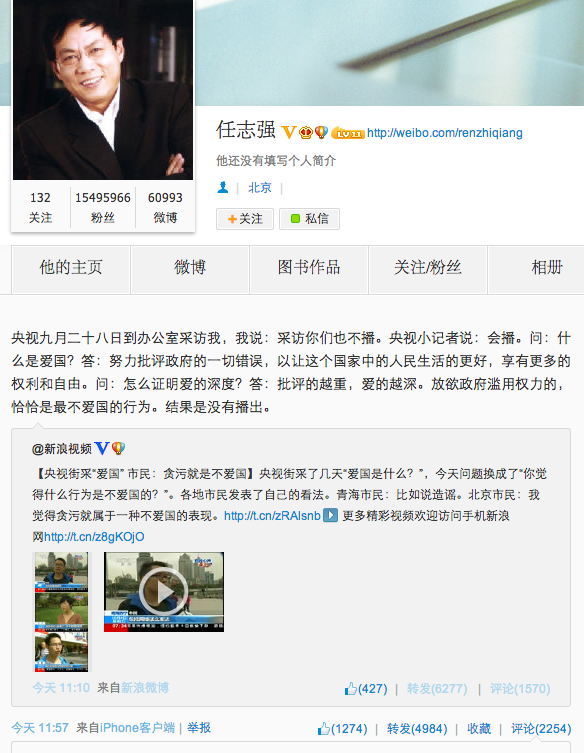A number of reports from the ongoing political assemblies in Beijing describe an air of tension arising from the government’s mounting intolerance of alternative viewpoints and “improper discussion” among officials and Party members. The meetings have been seen as a chance to assess whether political elites are falling in line. Last weekend, authorities appeared to send a cautionary signal with the deletion of outspoken property tycoon Ren Zhiqiang’s accounts on Sina and Tencent Weibo. The apparent trigger was Ren’s declaration that state media should place the public before the Party, directly challenging Xi Jinping’s recent statements on media policy. His local Party committee has hinted at further repercussions. According to the South China Morning Post’s Zhen Liu, delegates have been less than forthcoming about the episode:
Asked about the controversy on Friday on the second day of the CPPCC’s annual session, Nobel laureate Mo Yan, whose pen name translates as “don’t speak”, brushed off the request with just one word: “Lunch.”
[…] Later, prominent film director and award-winning actor Feng Xiaogang tried to exit a meeting room under cover of a baseball cap.
When asked about Ren, Feng, the “Spielberg of China” who was quoted three years ago as saying “censorship is torment”, raised a finger to his lips.
“Shush,” he whispered. And walked away. [Source]
The New York Times’ Didi Kirsten Tatlow also reported on the disquiet, noting the appearance of an incongruous article from the agency that is leading the charge against “political indiscipline.”
“The two sessions are for discussing important national matters and putting forward constructive opinions, not for the discussion of trivia,” Mr. Jiang [Hong], who is a professor at the Shanghai University of Finance and Economics [and a member of the CPPCC], told Caixin in an article posted on Thursday.
“But because of the influence of certain events, everyone is a bit dazed, and people don’t want to talk so much. That’s what the atmosphere is like,” he said, without explaining what those events were.
[…] Hinting at the reasons behind the chill that Mr. Jiang discerned, another article this week, in the newspaper belonging to the Central Discipline Inspection Commission, the country’s powerful antigraft agency, said that people should be allowed to speak truth to power and that the Communist Party could, and should, tolerate that.
[…] “Don’t be afraid of saying something wrong,” it said. “Be afraid of saying nothing at all.” [Source]








